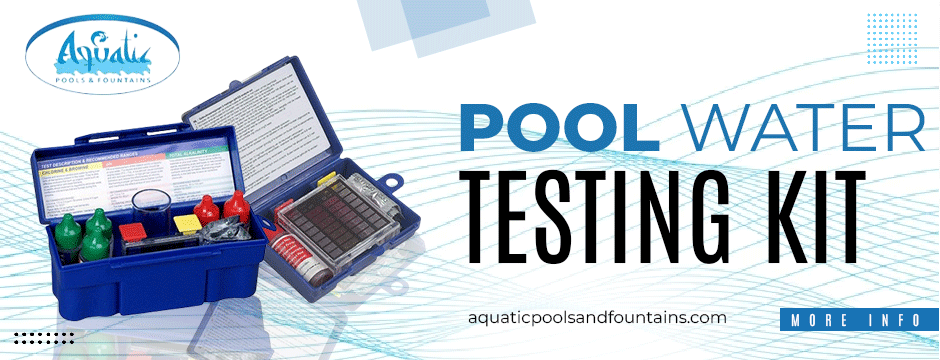If you have a swimming pool at your home and are looking for an easy solution to maintain the cleanliness of the water, this article may help you. Maintaining the clean water in a swimming pool is not an easy task. But before indulging into the cleaning process, it is needed to know whether the water has become contaminated or not. In this case, one can take the help of Pool Water Testing Kits. In this article we will discuss how a water testing kit can simplify the process of cleaning pool water. On the other hand, we will also discuss which would be the best company from where you can connect the best kits

Before we dive into the specifics of water testing kits, let’s first discuss why testing your pool water is crucial. Pool water is constantly exposed to various environmental factors, such as sunlight, debris, and swimmers’ body oils. These elements can throw off the water’s pH levels, chlorine levels, and overall balance, leading to issues like algae growth, cloudy water, and skin irritation.
Regularly testing your pool water allows you to monitor its chemical composition and make necessary adjustments to keep it clean and safe for swimming. By maintaining the proper balance of chemicals, you can prevent costly problems and prolong the life of your pool equipment.
Pool Water testing kits come in a variety of forms, ranging from simple test strips to advanced digital testers. Each kit typically includes tests for pH, chlorine levels, alkalinity, and sometimes additional parameters like calcium hardness and cyanuric acid.
Test strips are the most basic and affordable option. Users simply dip the strip into the pool water and compare the colors to a chart to determine the chemical levels. While convenient, test strips may not always provide the most accurate results.
Liquid test kits involve adding reagents to a water sample and observing color changes to determine chemical levels. While more accurate than test strips, liquid kits can be more time-consuming and require more steps.
Digital testers are the most advanced option, providing precise readings of chemical levels in a matter of seconds. While they tend to be more expensive upfront, digital testers offer unparalleled accuracy and convenience, making them ideal for serious pool owners.
Regardless of which type of water testing kit you choose, the testing process itself is relatively straightforward. Start by collecting a water sample from about elbow deep in your pool, away from the skimmer and return jets. Make sure to rinse the sample container thoroughly with pool water before filling it to avoid contamination.
Once you’ve obtained your sample, follow the instructions provided with your testing kit to perform the necessary tests. Record the results and compare them to the ideal ranges for each chemical parameter. If any levels are outside the recommended range, you’ll need to take action to correct them.
Understanding what your test results mean is essential for effective pool maintenance. Here’s a brief overview of the key parameters you’ll be testing for and their ideal ranges:
pH: The pH level of your pool water should typically fall between 7.2 and 7.6. Maintaining the proper pH balance is crucial for preventing corrosion, scale formation, and skin irritation.
Chlorine: Chlorine is the primary sanitizer used in pools to kill bacteria and algae.
The optimal chlorine concentration falls within the range of 1 to 3 parts per million (ppm). Low chlorine levels can result in cloudy water and algae growth, while high levels can cause skin and eye irritation.
Alkalinity: Total alkalinity acts as a buffer against pH fluctuations and should be maintained between 80 and 120 ppm. Low alkalinity can lead to pH instability, while high alkalinity can cause cloudiness and scale formation.
Calcium Hardness: Calcium hardness refers to the concentration of calcium ions in the water and should be kept between 200 and 400 ppm. Insufficient calcium hardness in pools can result in the erosion of pool surfaces, whereas excessive levels can lead to the buildup of scale.
If your test results indicate that your pool water is out of balance, it’s essential to take corrective action promptly. This may involve adding chemicals such as pH increase or reducer, chlorine shock, alkalinity increase, or calcium hardness increase, depending on the specific issue.
Be sure to follow the manufacturer’s instructions carefully when adding chemicals to your pool, and always test the water again after treatment to ensure that the desired balance has been achieved.
Aquatic Pools and Fountains L.L.C. stands out as a leading provider of top-tier pool maintenance solutions, offering a comprehensive range of testing kits designed to meet the needs of pool owners at every level. Their commitment to excellence is evident in their selection of high-quality products, including renowned options like the Lovibond Scuba II 5 in 1 Digital Water Tester, Palintest PoolTest 6 Lumiso Photometers, 6-way Pool Test Kits, and Aqua Chlorine PH Test Kit.
These advanced testing kits provide precise and reliable measurements of crucial chemical parameters, empowering pool owners to maintain optimal water balance with ease. With Aquatic Pools and Fountains L.L.C customers can trust that they’re investing in tools that deliver accurate results and streamline the pool maintenance process for a pristine swimming experience.
Keeping up with pool maintenance doesn’t need to feel overwhelming. With the help of Pool water testing kits, you can simplify the process and ensure that your pool stays clean, clear, and safe for swimming. By regularly testing your pool water and making necessary adjustments, you can enjoy a sparkling oasis all season long. Invest in a quality water testing kit today and take the guesswork out of pool maintenance. Your pool—and your swimmers—will thank you.